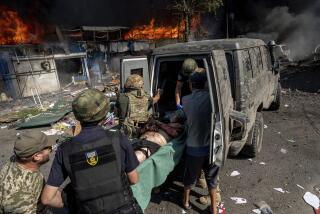The New New World Order: Chaos
- Share via
A degree of flux and disorder has been a permanent feature of the international system for quite some time. Recent developments, however, raise the question of whether the normal amount of upheaval is being gradually replaced by a state of global anarchy.
For example, the director of the National Security Agency, Gen. Mike Hayden, recently stated that Osama bin Laden, the Saudi exile wanted for a string of terrorist attacks on U.S. targets, has better communications technology than the U.S. In a TV interview, the general claimed that Bin Laden was able to orchestrate almost simultaneous bombings without NSA detection because he “has at his disposal the wealth of a $3-trillion-a-year telecommunications industry that he can rely on. . . . He has better technology.” The NSA, on the other hand, is “behind the curve in keeping up with the global telecommunications revolution.”
If Hayden is right about American capabilities in this area, there is cause for much alarm. After all, it has become known during the ongoing trial of some of Bin Laden’s followers that he has attempted to buy uranium on the black market. Reports also suggest that Bin Laden’s organization has been testing chemical weapons. Moreover, several other terrorist organizations with global networks, such as Hezbollah, which is directly sponsored by Iran, would have little difficulty acquiring communication technology similar to that at Bin Laden’s disposal.
As if this was not enough, a CIA report just delivered to Congress on global proliferation activities implicitly confirms that the U.S. has lost the struggle to contain the spread of chemical, biological and nuclear weapons. The report notes that Russia, China and North Korea are actively assisting countries seeking weapons of mass destruction and the means to deliver them over long distances. It adds that countries determined to maintain weapons of mass destruction and missile programs have worked to insulate their programs against interdiction and disruption, and they have tried to reduce their dependence on imports by developing indigenous production. Not only is gathering intelligence about such programs becoming increasingly more difficult but, the CIA predicted, the U.S. access to critical world areas would come under threat.
Since the addition of Pakistan and India to the nuclear club has had no adverse impact on world stability, it could be argued that last month’s assessment of the German Federal Intelligence Service that Saddam Hussein could have a bomb within three years should be taken in stride. Yet even if Iran and Iraq refrain from actually using nuclear weapons once they acquire them, the kind of international mischief these regimes could sponsor once shielded by their new weapons is frightening.
Moreover, by 2005, the German intelligence service expects Iraq to also possess ballistic missiles with a range of 3,000 kilometers and capable of hitting targets in Europe. Iran is also working on long-range missiles. Both countries would be able to blackmail the U.S. and its allies by holding European cities hostage. As U.S. Defense Secretary Donald Rumsfeld told the Munich Conference on European Security Policy in February: “Terror weapons don’t need to be fired. They just need to be in the hands of people who would threaten their use. And it alters behavior. We know that.”
There is also growing disrepair among Washington’s alliances--the guardians of the existing world order. Japan’s dire economic straits and the growing political and economic turmoil in Turkey have worrisome strategic and diplomatic angles. The decline of Japan would certainly allow China to increase its weight in East Asia. This could have troubling implications for Taiwan, especially if the U.S. was increasingly preoccupied elsewhere. North Korea is also likely to resort to new diplomatic and military pressure tactics if Japan’s regional clout diminished. Similarly, any weakness on the part of Turkey is likely to be exploited by Iran, Iraq and Syria.
The rise of global anarchy should not be viewed as just the onset of greater international disorder. The coming chaos signifies a paradigm shift whose common denominator is that the “good guys”--the democratic, moderate, peace-seeking members of the international system--may be on the verge of a prolonged and possibly permanent retreat in the face of extremist and aggressive forces. Such international lawlessness is sure to reignite calls for greater isolationism in U.S. foreign policy and to encourage the spread of a Fortress America mentality. Such a posture, however, is guaranteed to make matters even worse, faster.
More to Read
Sign up for Essential California
The most important California stories and recommendations in your inbox every morning.
You may occasionally receive promotional content from the Los Angeles Times.













